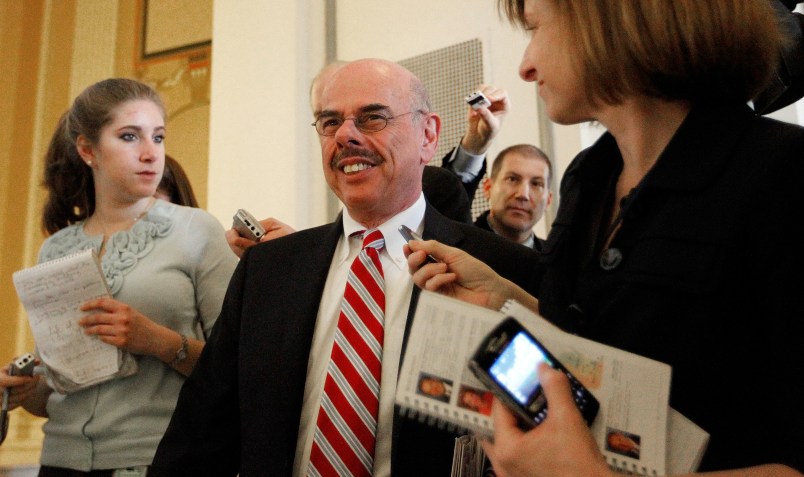Rep. Henry Waxman’s (D-CA) decision to retire means the tenure of one of the most influential liberal members in Congress is coming to an end.
In a Mother Jones piece reacting to Waxman’s announcement on Thursday Washington Bureau Chief David Corn wrote that Waxman had been “Capitol Hill fixture and progressive crusader for decades, since he was first elected in 1974.” Fellow California Democrat Rep. George Miller and Waxman, arguably the two most high profile liberals to announce retirement plans this cycle, are also part of the class of lawmakers elected right after the Watergate scandal. They have served continuously since then.
Waxman’s tenure was marked by more than two dozen legislative victories ranging from climate change to health care to modernizing the U.S. Postal Service to passing new telecommunication laws. Waxman was a major player in helping to pass the Affordable Care Act.
The House Energy and Commerce Committee has kept track of the 32 major legislative accomplishments Waxman played a role in passing. The list below comes from the document they released on Thursday:
The Affordable Care Act, which gives all Americans access to affordable health insurance, strengthens Medicare and Medicaid, and reduces the deficit.
Medicaid and CHIP Expansions, which extended the coverage and benefits available to millions of needy and working families.
Nursing Home Reforms, which stopped the industry’s worst abuses and protected the rights of vulnerable residents.
The Waxman-Hatch Generic Drug Act, which gave rise to the generic drug industry, saving consumers over $1 trillion in the last decade alone.
The Orphan Drug Act, which gave drug companies incentives to develop treatments for rare diseases they had previously ignored.
The Ryan White CARE Act, which provides medical care and other services to Americans living with HIV/AIDS.
Women’s Health Initiatives, including the laws establishing standards for mammography, requiring the inclusion of women in clinical trials, and creating the Office of Research on Women’s Health at NIH.
The National Childhood Vaccine Injury Act, which strengthened FDA oversight of vaccine manufacturers and created a no-fault compensation system for vaccine-related injuries.
FDA User Fee Laws, which raise hundreds of millions of dollars each year from drug and device manufacturers to fund vital FDA functions.
The Nutrition Labeling Act, which mandated the ubiquitous and popular nutrition labels that consumers rely upon to compare packaged foods.
The Food Quality Protection Act, which established a strong health-based standard for pesticide residues in food.
The Food Safety Modernization Act, which sets science-based standards for the safe production and harvesting of raw agricultural commodities and requires new preventative controls for companies that process or package foods.
Cigarette and Smokeless Tobacco Health Warning Laws, which required rotating Surgeon General warnings on cigarette packages and advertisements and the first health warnings on smokeless tobacco packages and advertisements.
The Family Smoking Prevention and Tobacco Control Act, which restricted the marketing of cigarettes and smokeless tobacco to children and gave FDA jurisdiction over tobacco products.
The Safe Medical Devices Act, which enhanced public protection from dangerous medical devices by requiring mandatory reporting of adverse events and surveillance and tracking of implantable devices.
The Drug Quality and Security Act, which strengthens FDA’s authority over compounded drugs and creates a uniform system for tracking drugs to prevent counterfeits.
The 1990 Clean Air Act Amendments, which established new programs to reduce urban smog, hazardous air pollution, and acid rain and prevent the depletion of the stratospheric ozone layer.
Safe Drinking Water Act Amendments, which strengthened the standards for drinking water and established funding mechanisms for drinking water infrastructure improvements.
Laws Reducing Childhood Lead Exposure, including laws removing lead from plumbing supplies, water coolers, and children’s toys, requiring disclosure of lead hazards during real estate transactions, and setting standards for safe renovations.
The Formaldehyde Standards Act, which set minimum standards for formaldehyde levels from plywood, fiberboard, and particleboard.
Laws Reducing Greenhouse Gas Emissions, including provisions requiring greater efficiency in federal buildings and procurement of clean vehicles.
Spectrum Reforms, which will ease the nation’s growing spectrum shortage, enable new “super WiFi” applications, and create a nationwide broadband network for first responders.
The 21st Century Video and Communications Accessibility Act, which increases the access of persons with disabilities to smart phones and other modern communications devices.
Procurement Reforms, which enhanced competition, transparency, and accountability in government contracting to reduce waste, fraud, and abuse.
The Postal Accountability and Enhancement Act, the first major overhaul of the U.S. Postal Service since 1970.
Waste, Fraud, and Abuse, identifying over $1 trillion in wasteful and mismanaged federal contracts, including billions of dollars of wasteful spending in Iraq and the response to Hurricane Katrina.
Misleading Intelligence, exposing over 200 misleading statements by senior Bush Administration officials about the threat posed by Iraq.
The Tobacco Industry, revealing decades of industry concealment of the dangers of smoking and the addictiveness of nicotine.
Steroids in Baseball, uncovering the extent of players’ illegal drug use during baseball’s “steroids era” and prompting major reforms in steroid policies in baseball and other sports.
Politicization of Science, disclosing dozens of instances in which Bush Administration officials distorted or misrepresented science, such as funding misleading abstinence-only education programs or censuring climate experts.
The Wall Street Collapse, examining the fall of Lehman Brothers and AIG, the failure of the credit rating agencies, and the negligence and mistakes of market regulators.
The Gulf Oil Spill, disclosing a series of overlooked warnings and risky decisions made by BP to reduce costs and save time.






